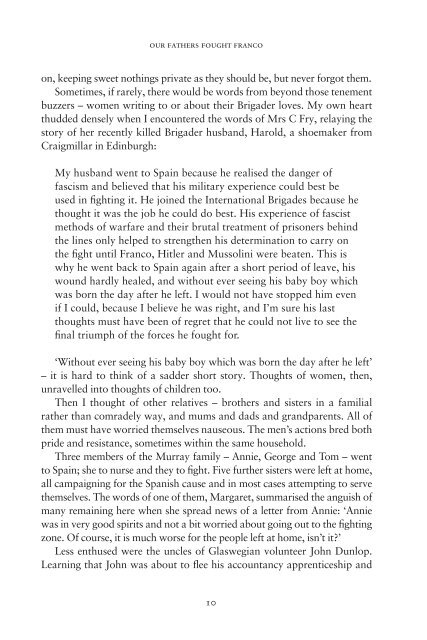Our Fathers Fought Franco by Willy Maley sampler
resonant piece of working class history, this book is a living link to four extraordinary stories. Why did these young men put their lives on the line and go to Spain to fight with the International Brigades? How did they all end up in the same prison cell? And what is their legacy today? James Maley, George Watters, Donald Renton and Archibald Williams were members of Machine Gun Company No. 2 of the XV International Brigade. This is the first book to focus on a small group of men who, from different starting-points, ended up on the same battleground at Jarama, and then in the same prisons after capture by Franco’s forces. Their remarkable story is told both in their own words and in the recollections of their sons and daughters, through a prison notebook, newspaper reports, stills cut from newsreels, interviews, anecdotes and memories, with a foreword by Daniel Gray. Our Fathers Fought Franco is a collective biography that promises to add significantly to the understanding of the motives of those who ‘went because their open eyes could see no other way’.
resonant piece of working class history, this book is a living link to four extraordinary stories. Why did these young men put their lives on the line and go to Spain to fight with the International Brigades? How did they all end up in the same prison cell? And what is their legacy today?
James Maley, George Watters, Donald Renton and Archibald Williams were members of Machine Gun Company No. 2 of the XV International Brigade. This is the first book to focus on a small group of men who, from different starting-points, ended up on the same battleground at Jarama, and then in the same prisons after capture by Franco’s forces.
Their remarkable story is told both in their own words and in the recollections of their sons and daughters, through a prison notebook, newspaper reports, stills cut from newsreels, interviews, anecdotes and memories, with a foreword by Daniel Gray.
Our Fathers Fought Franco is a collective biography that promises to add significantly to the understanding of the motives of those who ‘went because their open eyes could see no other way’.
Create successful ePaper yourself
Turn your PDF publications into a flip-book with our unique Google optimized e-Paper software.
<strong>Our</strong> <strong>Fathers</strong> <strong>Fought</strong> <strong>Franco</strong><br />
on, keeping sweet nothings private as they should be, but never forgot them.<br />
Sometimes, if rarely, there would be words from beyond those tenement<br />
buzzers – women writing to or about their Brigader loves. My own heart<br />
thudded densely when I encountered the words of Mrs C Fry, relaying the<br />
story of her recently killed Brigader husband, Harold, a shoemaker from<br />
Craigmillar in Edinburgh:<br />
My husband went to Spain because he realised the danger of<br />
fascism and believed that his military experience could best be<br />
used in fighting it. He joined the International Brigades because he<br />
thought it was the job he could do best. His experience of fascist<br />
methods of warfare and their brutal treatment of prisoners behind<br />
the lines only helped to strengthen his determination to carry on<br />
the fight until <strong>Franco</strong>, Hitler and Mussolini were beaten. This is<br />
why he went back to Spain again after a short period of leave, his<br />
wound hardly healed, and without ever seeing his ba<strong>by</strong> boy which<br />
was born the day after he left. I would not have stopped him even<br />
if I could, because I believe he was right, and I’m sure his last<br />
thoughts must have been of regret that he could not live to see the<br />
final triumph of the forces he fought for.<br />
‘Without ever seeing his ba<strong>by</strong> boy which was born the day after he left’<br />
– it is hard to think of a sadder short story. Thoughts of women, then,<br />
unravelled into thoughts of children too.<br />
Then I thought of other relatives – brothers and sisters in a familial<br />
rather than comradely way, and mums and dads and grandparents. All of<br />
them must have worried themselves nauseous. The men’s actions bred both<br />
pride and resistance, sometimes within the same household.<br />
Three members of the Murray family – Annie, George and Tom – went<br />
to Spain; she to nurse and they to fight. Five further sisters were left at home,<br />
all campaigning for the Spanish cause and in most cases attempting to serve<br />
themselves. The words of one of them, Margaret, summarised the anguish of<br />
many remaining here when she spread news of a letter from Annie: ‘Annie<br />
was in very good spirits and not a bit worried about going out to the fighting<br />
zone. Of course, it is much worse for the people left at home, isn’t it?’<br />
Less enthused were the uncles of Glaswegian volunteer John Dunlop.<br />
Learning that John was about to flee his accountancy apprenticeship and<br />
10


















